As Ukraine War Rewrites Geopolitics, Keep Your Eye on Serdar Berdymukhamedovar
Turkmenistan is something of an enigma, often described as isolationist in the manner of North Korea. Yet the remote nation is emerging as a power of sorts.

ZURICH — Earlier this week and without much fanfare, power transferred hands in Turkmenistan. As regime changes go, this one was hardly revolutionary. Serdar Berdymukhamedov, son of Turkmenistan’s 65-year-old president, Gurbanguly Berdymukhamedov — known, in the manner of a storybook superhero, as “The Protector” — won the election at a canter.
Along with the younger Mr. Berdymukhamedov — who, having recently turned 40, is now at the minimum age required for the presidency — eight other candidates appeared on the ballot. All were presidential loyalists, their presence ostensibly intended to feign competitiveness. Yet the young Mr. Berdymukhamedov won just 73 percent of the vote compared to his father’s 97 percent winning mandate in 2017.
The junior Mr. Berdymukhamedov is a surly technocrat who exudes a charisma-free image. His résumé reads like that of a fast-tracked corporate executive, with spells in the army, foreign office, energy ministry, a stint as counselor of embassy at the Turkmen Mission to the United Nations in Geneva, and the governorship of Ahal Province. So far, so standard.
Yet there is still time for dictatorial eccentricities to emerge. The elder Mr. Berdymukhamedov would often appear at official events on horseback clad in elaborate coats and wearing fluffy white hats. On other occasions he would don garish tracksuits. In 2019 he recorded a workout video to teach law enforcement officials how to exercise.
Obsessed by Guinness World Records, The Protector busied state officials with important contributions to world culture, such as the most public fountain pools and the largest indoor Ferris wheel. All of this from a man who began his career as a dentist.
Turkmenistan is an enigma. With “permanent neutrality” enshrined in its constitution, the country is often described as isolationist in the manner of North Korea. Yet the remote nation with its history of quirky and authoritarian leaders is emerging as a power of sorts — all the more as the war in Ukraine has brought to the surface the vulnerabilities of global energy politics and made unsavory, at least for now, Russian gas.
Vast are Turkmenistan’s mineral resources. Its gas fields alone amount to 4 percent of global reserves. The Galkynysh field, inaugurated in 2013 with the help of Communist China, is the world’s second largest. From there, the 1,800-mile Central Asia-China pipeline runs across Uzbekistan and Kazakhstan to Xinjiang Uighur Autonomous Region to supply China’s nationwide gas network.
Turkmenistan has become China’s largest supplier of natural gas, and China its biggest financier — a role previously assumed by Russia. Beijing has allocated more than $8.1 billion to the expansion of Turkmenistan’s gas fields. Agreements signed in January have added an additional $106 million to that amount. Turkmenistan is expected to repay the debt with gas.
Along with Beijing, India is also an eager patron of Turkmen gas. For the last 27 years Turkmenistan has attempted to construct a pipeline across Afghanistan, Pakistan, to India. Complicated geopolitics — cooperation with the Taliban, say, or New Delhi’s reluctance to depend on transit through Pakistan — have repeatedly stymied the project.
Yet the Taliban-led government in Afghanistan last year pledged support for the project, vowing to ensure its completion and security. Its commitment remains to be seen. Despite its reservations, too, India has partnered with the involved parties to form an investors’ consortium for pipeline construction. Transit pricing and financing remain key bottlenecks.
Just weeks before Russian tanks entered Ukraine, Moscow signaled its interest in the project. “Such perspective appears politically attractive,” a special envoy to Vladimir Putin, Zamir Kabulov, told Russian state press. Russia’s ostensible participation in the Turkmen-Afghan-Pakistan-Indian pipeline could give it access to each respective market. This could allow it to further skirt Western sanctions and alleviate some of its mounting dependence on Beijing.
This has helped precipitate Europe into a tizzy. Turkmenistan currently has no way of delivering gas to Europe on its own. Exports must travel through Russia, or through Iran via Turkey — both unsavory options.
Yet for the last 23 years, Turkmenistan has been planning to build a pipeline across the Caspian Sea to Azerbaijan from where it could connect, via Turkey, with the Trans Adriatic Pipeline to the heel of Italy. In 2019, President Trump wrote to Mr. Berdymukhamedov, the elder, encouraging Turkmen gas exports to the West. He wrote also to Azerbaijan’s Ilham Aliyev, praising his efforts to diversify European energy routes and sources.
Political squabbles among Caspian states over the delineation of the sea have for decades frustrated construction efforts. Not wanting to have its influence undermined, Russia has also continued to use its littoral rights to block the route on environmental grounds.
Still, steady signs of progress have been emerging with the Convention on the Legal Status of the Caspian Sea signed in 2018 and construction negotiations revived. As President Putin positioned his troops on Ukraine’s border, European Union leaders in January traveled to Azerbaijan to request gas in case a Russian war in Ukraine would sever Russian supplies. The Trans-Caspian Gas Pipeline has, it seems, again tickled the European imagination.
The newly elected president, Mr. Berdymukhamedov, could then yet emerge a power broker as the world reinvents its energy networks in the wake of the war in Ukraine. Turkmenistan, six million people strong, could yet be a pivotal geopolitical actor. Just look out for the authoritarian quirks.

